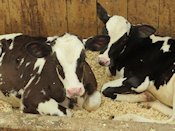|

Preparation
 Agricultural Engineering graduates may
improve crop production system, design animal facilities, analyze food
production systems, or test machinery. They must have strong
analytical stills and be detail oriented. In addition, they must work well
in team situations as they are often called upon to work in a group setting
with other engineers and with others outside of engineering. Agricultural Engineering graduates may
improve crop production system, design animal facilities, analyze food
production systems, or test machinery. They must have strong
analytical stills and be detail oriented. In addition, they must work well
in team situations as they are often called upon to work in a group setting
with other engineers and with others outside of engineering.
 Agricultural Engineering Programs Agricultural Engineering Programs
A bachelor's degree in engineering is required for almost all entry-level
engineering jobs. Accredited agricultural engineering programs usually
provide broad studies in the physical, chemical, and biological sciences in
addition to course work in civil, mechanical, and/or chemical engineering.
It is important to select a program that is accredited
in Agricultural Engineering. Programs accredited in Agricultural
Engineering are sometimes also called Biosystems Engineering, Bioresource Engineering, or Biological System
Engineering.
 Admission Requirements Admission Requirements
Admissions requirements for undergraduate engineering
schools include a solid background in mathematics (algebra, geometry,
trigonometry, and calculus) and science (biology, chemistry, and physics),
and courses in English, social studies, humanities, and computer and
information technology. Bachelor's degree programs in engineering typically
are designed to last 4 years, but many students find that it takes between
4 and 5 years to complete their studies. In a typical 4-year college
curriculum, the first 2 years are spent studying mathematics, basic
sciences, introductory engineering, humanities, and social sciences. In the
last 2 years, most courses are in engineering, usually with a concentration
in one branch. For example, the last two years of an agricultural
engineering program might include courses in avian biology, soil science,
plant physiology, and manufacturing systems engineering.
 Co-ops Co-ops
Internships and Coops provide students with a great
opportunity to gain real-world experience while still in school. Many
universities offer co-op and internship programs for students studying
Agricultural Engineering. Click here for more
information.
 Courses of Study Courses of Study
Students specializing in Agricultural Engineering will learn
to integrate engineering analysis and design with biology to address
challenges in the production, processing, packaging, and distribution of
diverse agricultural products. It requires knowledge of a range of
subjects which may include field machinery design, soil science, plant
physiology, avian biology, engineering hydraulics, and entomology. Students
pursuing a degree in agricultural engineering usually complete a diverse
curriculum to prepare them to work toward improving agricultural systems.
 Accredited Programs Accredited Programs
Those interested in a career in Agricultural Engineering
should consider reviewing engineering programs that are accredited by ABET,
Inc.
Note: Some resources in this section are provided by the US
Department of Labor, Bureau of Labor
Statistics.
|
|